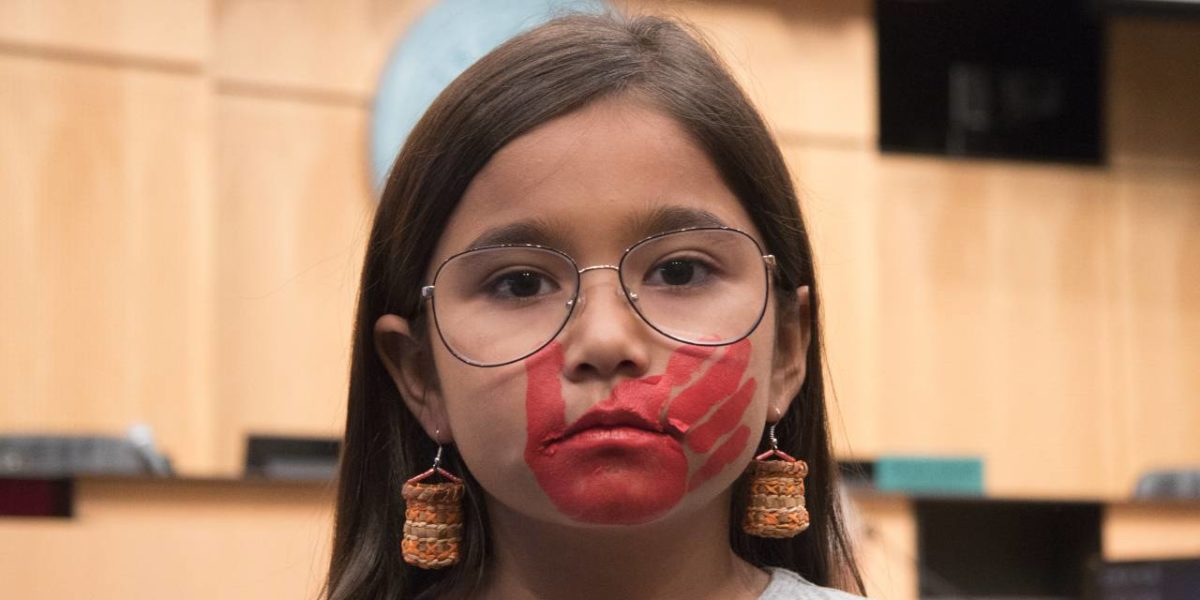Content warning: The following story contains details of Missing and Murdered Indigenous Women and Girls. Individuals impacted by the issue of Missing and Murdered Indigenous Women and Girls can contact the MMIWG Crisis Line toll-free at 1-844-413-6649.
Ahead of Tuesday’s Sisters in Spirit rallies across Canada commemorating Missing and Murdered Indigenous Women and Girls and Two-Spirits (MMIWG2S), Amnesty International held a press conference featuring families of victims who have tragically disappeared or died.
The event called out negligence by law enforcement and the lack of accountability for police forces investigating the disappearance and deaths of MMIWG2S.
The speakers were made up of relatives of four Indigenous women and girls who disappeared or died in the Lower Mainland of British Columbia. Loved ones agree that police failed to conduct a proper and thorough investigation into their disappearances and deaths.
The press conference also gave the loved ones of victims the platform to share how the inaction, complacency and negligence by police impacted their lives, with many being left to their own devices to find answers.
Speaking about her sister Ramona Wilson, who went missing in 1994 and whose case remains unsolved nearly 30 years later, Brenda remembered what the RCMP told her when she asked them to help find her daughter.
“You know, maybe she just needs a break from you guys,” the officer said.
For Brenda, her sister Ramona was not only the life of their family — she was also their bloodline.
“Our bloodline stopped with Ramona,” Brenda said. “You’ve just ruined a family.”
The 21-year fight for Gladys Tolley
Bridget Tolley, an Algonquin activist and founder of Families of Sisters in Spirit, knows the pain of police brutality all too well.
Speaking to reporters virtually from Ottawa, Tolley referred to Parliament Hill as “a place where it has been acknowledged that Canada not only has an epidemic of violence, but a history of genocide against Indigenous women and girls.”
Every year on October 4, she stands in front of Parliament Hill calling for justice for her mother, 61-year-old Gladys Tolley, who was struck and killed while crossing the highway in her community of Kitigan Zibi by a police officer driving a Sûreté du Québec cruiser on October 5, 2001.
According to Tolley, the officer who struck her mother was cleared after a three-month investigation that ruled Gladys’ death as accidental. She argues the investigation offered “no transparency, accountability or respect for being on reserve and outside of provincial police jurisdiction.”
“We demand more and better from our governments, our politicians, police and the judges in the justice system,” Tolley told reporters. “We will not sit quietly while there are policies that take away our power, mishandle our cases and blame us, when we know the real problem is this systematic injustice that is rooted in colonization.”
Police fail to connect homicide victim to missing Indigenous woman
Speaking of her daughter’s deep love of learning, gift of gab, and her ability to speak up even if she was afraid, Natasha Harrison noted that Tatyanna would have celebrated her 21st birthday last week.
“Even as a young child, she had a desire to help others, and was openly vocal for anything unjust,” Natasha said. “And I know in my heart she wouldn’t be OK with the injustice surrounding her death.”
Pointing out that the investigation into her daughter’s death was flawed from the very beginning, Natasha explained that police found Tatyanna’s body on May 2 at a dry dockyard shelter marina in Richmond, B.C.
But the police didn’t identify Tatyanna for three months, despite Natasha reporting her missing on May 3, the day after police located her remains. Tatyanna would not be reported missing by Surrey RCMP until May 11.
On June 20, according to Natasha, a dispatcher would go on to “misinform a woman calling in a tip by notifying the caller Tatyanna had been found.”
On July 14, Richmond RCMP released a sketch of what they believe the then-unidentified victim looked like, asking the public for help in an effort to identify the body.
“This sketch and description didn’t match Tatyanna at all,” Natasha said, noting the release described the victim as “a caucasian woman 30- to 40-years-old with short, curly hair, five-foot five and 90 pounds.”
Tatyanna’s actual description, according to Natasha, is a 20-year-old woman with thick, slightly wavy hair, five-foot one and 100 pounds — creating several discrepancies in the account of law enforcement.
It wasn’t until August 5 that police would confirm they identified Tatyanna’s body. Natasha says her daughter was found with no clothes on, no shoes, and no phone. She says the coroner failed to conduct an appropriate assault kit as part of her autopsy based on the circumstances of how her body was found.
“We’re still waiting for the full toxicology report that lists the narcotics that render someone immobile or unconscious,” Natasha said.
But according to her, police aren’t waiting for the toxicologist’s findings — they’ve already closed her file.
“We need to end the careless disregard of human life based on race, stigma and class,” she added. “All humans deserve justice.”
A demonstration to honour missing and murdered Indigenous women, girls and two-spirits is set to take place Tuesday on Parliament Hill.



